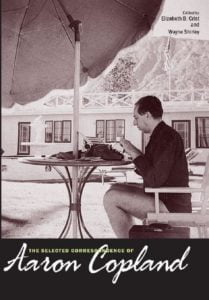Copland: Four Piano Blues No. 1 (with sheet music download)
Browse in the Library:

Aaron Copland – A short biography
American composer Aaron Copland is known for works like “Appalachian Spring” and “Fanfare for the Common Man,” among many others.
Who Was Aaron Copland?
Aaron Copland was born in Brooklyn, New York, and went on to study piano and composition and studying in Europe for some time. He became one of the century’s foremost composers with highly influential music that had a distinctive blend of classical, folk and jazz idioms. Some of Copland’s most prominent pieces included Fanfare for the Common Man, El Salon Mexico and Appalachian Spring, for which he won the Pulitzer. An Oscar-winning writer of film scores as well, Copland died on December 2, 1990.
Early Years and Travels
Composer Aaron Copland was born on November 14, 1900, in Brooklyn, New York to parents of Jewish and Eastern European descent. The youngest of five children, Copland went on to develop an interest in the piano, receiving guidance from his older sister. He later studied under Rubin Goldmark in Manhattan and regularly attended classical music performances. At 20 years old Copland opted to continue his studies in Fontainebleau, France, where he received tutelage from the famed Nadia Boulanger.
A Visionary Composer
Studying a variety of European composers while abroad, Copland made his way back to the U.S. by the mid-1920s. Having been asked by Boulanger to write an organ concerto, Copland eventually debuted Symphony for Organ and Orchestra on January 11, 1925, with the New York Symphony Society under Walter Damrosch.
The decade that followed saw the production of the scores that would spread Copland’s fame throughout the world. He was concerned with crafting sounds that would be seen as “American” in its scope, incorporating a range of styles in his work that included jazz and folk and connections to Latin America.
Some of his most well-known pieces include Piano Variations (1930), The Dance Symphony (1930), El Salon Mexico (1935), A Lincoln Portrait (1942) and Fanfare for the Common Man (1942). Copland later composed the music to Martha Graham’s 1944 dance Appalachian Spring. The following year Copland won the Pulitzer Prize for the piece.
An author as well, Copland published the first edition of the book What to Listen for in Music in 1939, followed by Our New Music (1941) and Music and Imagination (1952). The latter title was shaped by the composer’s Norton Lectures at Harvard, and he also taught at the New School for Social Research.
Oscar for ‘Heiress’
Copland was a renowned composer of film scores as well, working on Of Mice and Men (1939), Our Town (1940) and The North Star (1943)—receiving Academy Award nominations for all three projects. He eventually won an Oscar for The Heiress (1949). And more than a decade later, Copland composed a stark, unsettling score for the controversial Something Wild (1961). Selections from his various works would be used in TV series and commercials over the years, as well as films like Spike Lee’s He Got Game (1998).
In his later compositions, Copland made use of a European derived tonal system. By the 1970s, he had ceased crafting new works, focusing on teaching and conducting.
Death
Copland died on December 2, 1990 in North Tarrytown, New York at 90 years old. Having received an array of accolades in his later years, the iconic composer had also worked with Vivian Perlis on a two-volume autobiography, Copland: 1900 Through 1942 (1984) and Copland Since 1943 (1989). A well-received, lengthy biography on his life was published in 1999—Aaron Copland: The Life & Work of an Uncommon Man, by Howard Pollack. And an extensive collection of Copland’s works, including his personal letters and photographs, are held by the Library of Congress.
Download Copland’s sheet music from our Library.
Legacy
Copland wrote a total of about 100 works which covered a diverse range of genres. Many of these compositions, especially orchestral pieces, have remained part of the standard American repertoire. According to Pollack, Copland “had perhaps the most distinctive and identifiable musical voice produced by this country so far, an individuality … that helped define for many what American concert music sounds like at its most characteristic and that exerted enormous influence on multitudes of contemporaries and successors.”
His synthesis of influences and inclinations helped create the “Americanism” of his music. The composer himself pointed out, in summarizing the American character of his music, “the optimistic tone”, “his love of rather large canvases”, “a certain directness in expression of sentiment”, and “a certain songfulness”.
While “Copland’s musical rhetoric has become iconic” and “has functioned as a mirror of America,” conductor Leon Botstein suggests that the composer “helped define the modern consciousness of America’s ideals, character and sense of place. The notion that his music played not a subsidiary but a central role in the shaping of the national consciousness makes Copland uniquely interesting, for the historian as well as the musician.”
Composer Ned Rorem states, “Aaron stressed simplicity: Remove, remove, remove what isn’t needed…. Aaron brought leanness to America, which set the tone for our musical language throughout [World War II]. Thanks to Aaron, American music came into its own.”
Aaron Copland’s music has served as the inspiration for a number of popular modern works of music:
- “Hoedown” – Annie Moses Band
- “Fanfare for the Common Man” – Emerson, Lake & Palmer
- “The Greatest Man That Ever Lived (Variations on a Shaker Hymn)” – Weezer (partially based upon “Variations on a Shaker Hymn”)
Copland’s music was prominently featured throughout Spike Lee‘s 1998 film, He Got Game.
